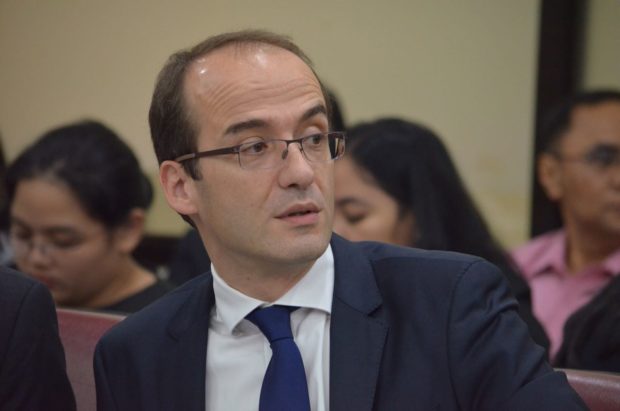The Asia Pacific head of Sanofi Pasteur was forced to apologize during a House inquiry on the Dengvaxia dengue vaccine for the “misunderstanding” sparked by his company’s statement in November that drew a public uproar and stoked fears of a nationwide health crisis.
“I am sorry if it has created confusion, which is why I came here to say there is no need to panic,” said Thomas Triomphe, who appeared at a joint hearing of the House health and good government and public accountability committees.
The French executive made the public apology after he was castigated by SAGIP Rep. Rodante Marcoleta for his company’s “insensitivity” to the concerns of the Filipino public.
“I want you to say sorry profusely. I want you to say sorry honestly… Please be considerate in your statements and be sensitive. This is our society. This is not Paris,” he told Triomphe.
“I do understand the concerns,” the Sanofi official said. “That is why I want to provide the facts and I want people to understand there’s no need to panic. I do apologize if there’s a misunderstanding.”
Under questioning by Nueva Ecija Rep. Estrellita Suansing, Triomphe insisted there was no “contradiction” between Sanofi’s first press release on Nov. 29 and its subsequent statements that appeared to downplay the risks in the aftermath of the public uproar.
“There is no contradiction,” he said.
He reiterated the points he made during the Senate hearing on Monday that the initial advisory indicated that patients who had not previously been administered the Dengvaxia vaccine stood only a 0.02 percent increased risk of getting dengue symptoms.
But Health Secretary Francisco Duque III said it was clear that Sanofi had made a turnaround.
“Kumambyo ‘tong mga ‘to e (These people shifted gears),” he told the body.
Duque noted that the Nov. 29 press statement of Sanofi stated that schoolchildren who had never had a history of dengue, or “seronegative persons,” were observed to have severe dengue symptoms.
“After four days they came out with a subsequent press releases stating that the symptoms we observed during the clinical trial were Grade 1 and 2 symptoms. I suspect they did observe Grade 3 symptoms, but they did not want to reveal this because the public uproar had reached a crescendo,” he said.
Grade 3 symptoms of dengue refer to “moderate to severe” cases, Duque explained.
But Triomphe said later that the word “severe dengue” was used because it was the term used in clinical trials.
He said that since 2010 an independent monitoring committee was the one conducting surveillance on Sanofi’s clinical trials of Dengvaxia and not the company itself.
He said earlier during the hearing that there was no truth to reports that the seronegative patients who had been administered Dengvaxia vaccine manifested “dengue hemorrhagic shock,” a sign of Grade 4 or severe dengue.
